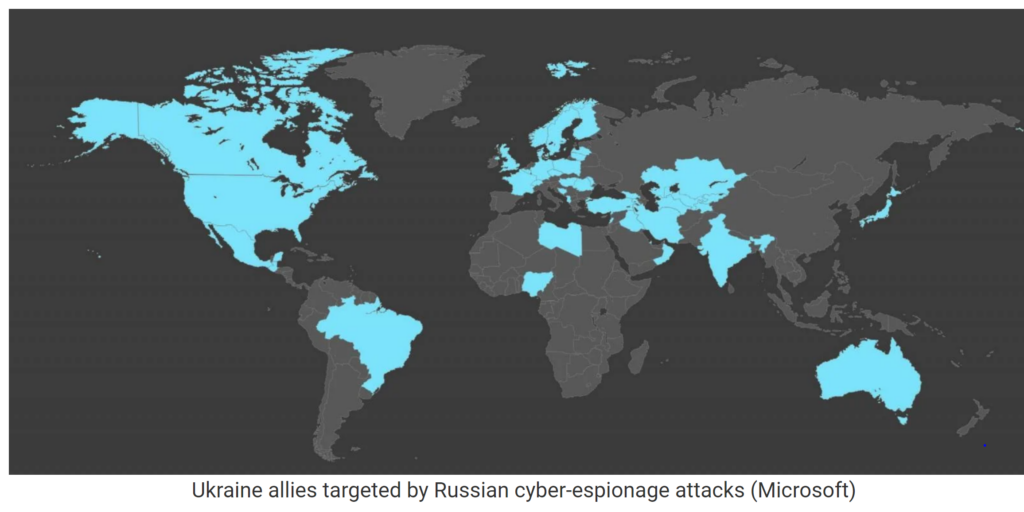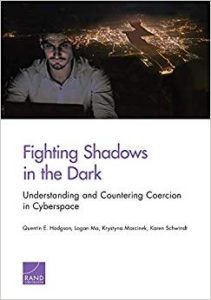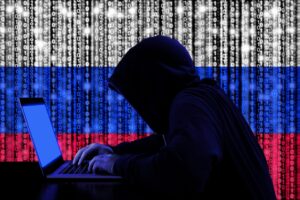Russia conducted more cyberattacks than was realized at the time to bolster its invasion of Ukraine, but more than two-thirds of them failed, echoing its poor performance on the battlefield, according to a new analysis.
The report, Defending Ukraine: Early Lessons from the Cyber War, published by Microsoft on Wednesday, suggested that the Kremlin was succeeding more than many expected with its disinformation campaign to establish a narrative of the war favorable to Russia, including its claim that the United States was secretly producing biological weapons inside Ukraine.
Microsoft had developed a new Russian Propaganda Index that measures user traffic to “Russian state-controlled and -sponsored news outlets and amplifiers” as a proportion to traffic to all news sites, The Post reports. In its debut appearance, the index showed the proportion of propaganda seen by users in Ukraine tripled in the first weeks of the war and rose by 86 percent in the United States.
A striking exception is Estonia, where Microsoft said it has detected no Russian cyber intrusions since Russia invaded Ukraine on Feb. 24. The company credited Estonia’s adoption of cloud computing, where it’s easier to detect intruders. “Significant collective defensive weaknesses remain” among some other European governments, Microsoft said, VOA reports.
Half of the 128 organizations targeted are government agencies and 12% are nongovernmental agencies, typically think tanks or humanitarian groups, according to the 28-page report. Other targets include telecommunications, energy and defense companies.
Ukraine was well prepared to fend off cyberattacks, the study notes, after having endured them for several years in part because of a well-established system of warnings from private-sector companies, including Microsoft and Google, and preparations that included moving much of its most important systems to the cloud, onto servers outside Ukraine.
“The war in Ukraine provides not only lessons but a call to action for effective measures that will be vital to the protection of democracy’s future,” adds Microsoft President Brad Smith. “Unfortunately, with sufficient planning and sophistication, these cyber-influence operations are well positioned to take advantage of the longstanding openness of democratic societies and the public polarization that is characteristic of current times.”
New advances to thwart these cyber threats are needed, and they will depend on four common tenets and — at least at a high level — a common strategy, he contends:
- The first defensive tenet should recognize that Russian cyber threats are being advanced by a common set of actors inside and outside the Russian Government and rely on similar digital tactics. As a result, advances in digital technology, AI, and data will be needed to counter them.
- Reflecting this, a second tenet should recognize that unlike the traditional threats of the past, cyber responses must rely on greater public and private collaboration.
- A third tenet should embrace the need for close and common multilateral collaboration among governments to protect open and democratic societies.
- And a fourth and final defensive tenet should uphold free expression and avoid censorship in democratic societies, even as new steps are needed to address the full range of cyber threats that include cyber influence operations.
An effective response must build on these tenets with four strategic pillars, Smith adds. These should increase collective capabilities to better (1) detect, (2) defend against, (3) disrupt, and (4) deter foreign cyber threats.
But social media companies are failing to tackle harmful disinformation on Syria, according to a new report.
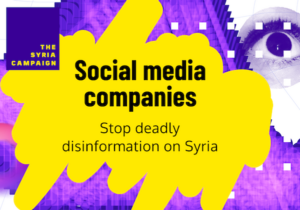 Human rights defenders, victims of war crimes, journalists and humanitarians on Syria’s frontlines have endured seven years of harassment and hate-filled disinformation attacks, in some cases endangering their lives, according to a Syria Campaign analysis, Deadly Disinformation: How online conspiracies about Syria cause real-world harm .
Human rights defenders, victims of war crimes, journalists and humanitarians on Syria’s frontlines have endured seven years of harassment and hate-filled disinformation attacks, in some cases endangering their lives, according to a Syria Campaign analysis, Deadly Disinformation: How online conspiracies about Syria cause real-world harm .
The report, based on data analysis by the Institute of Strategic Dialogue, identifies 10 key impacts in the real world, and urges governments and social media platforms to take urgent action to stop disinformation over Syria.
“For far too long, disinformation has been systematically used by the Assad regime and Russia to cover up their war crimes in Syria and deny the role they have played in civilian suffering, ” said Laila Kiki, Executive Director of The Syria Campaign.“We have seen how Twitter, Facebook and others have stepped up their efforts and deployed additional resources to tackle disinformation in other contexts including the Covid pandemic and the war in Ukraine,” she added. “They must now take urgent steps to protect Syria’s humanitarian workers and human rights defenders from Russian-backed and inspired disinformation.”
The United States should play a more active role in combating Russian propaganda and online disinformation because of the threat to democracy, European Commission Vice President Vera Jourova told the Atlantic Council (below).
“I think that for the United States, as a cradle for both democracy 200 years ago and for the ‘dot com’ or tech revolution some 20 years ago, the time for no action is over,” she said. “In the past, people said democracy dies in silence. Today, democracies may die in noise and cacophony.”
“Do not throw away your shot and help us protect democracy from the risk coming from both online and offline world,” Jourova told the E.U.-U.S. Defense & Future Forum.
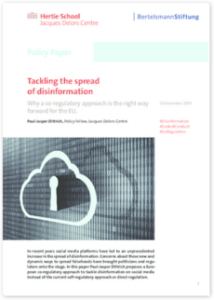 Russia’s unprecedented hybrid war in Ukraine has challenged the world’s democracies to think anew about how to combat cyber attacks and foreign information operations, the Reagan Institute reports.
Russia’s unprecedented hybrid war in Ukraine has challenged the world’s democracies to think anew about how to combat cyber attacks and foreign information operations, the Reagan Institute reports.
What is the role of the government, private sector, and civil society in protecting against this complex threat? That question was the focus of a virtual forum (above) on “Countering Foreign Information Operations: Developing a Whole of Society Approach to Build Resilience.” Hosted by the Center for Freedom and Democracy, the event featured a panel discussion with Microsoft President Brad Smith, Senator Angus King (I-ME), McCain Institute Executive Director Dr. Evelyn Farkas, and American Enterprise Institute Senior Fellow Klon Kitchen.

